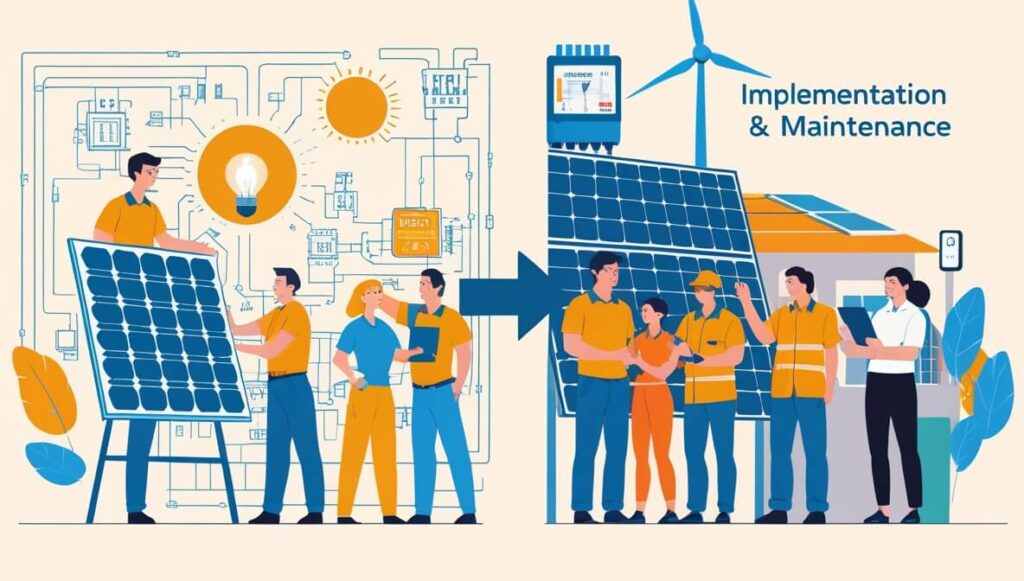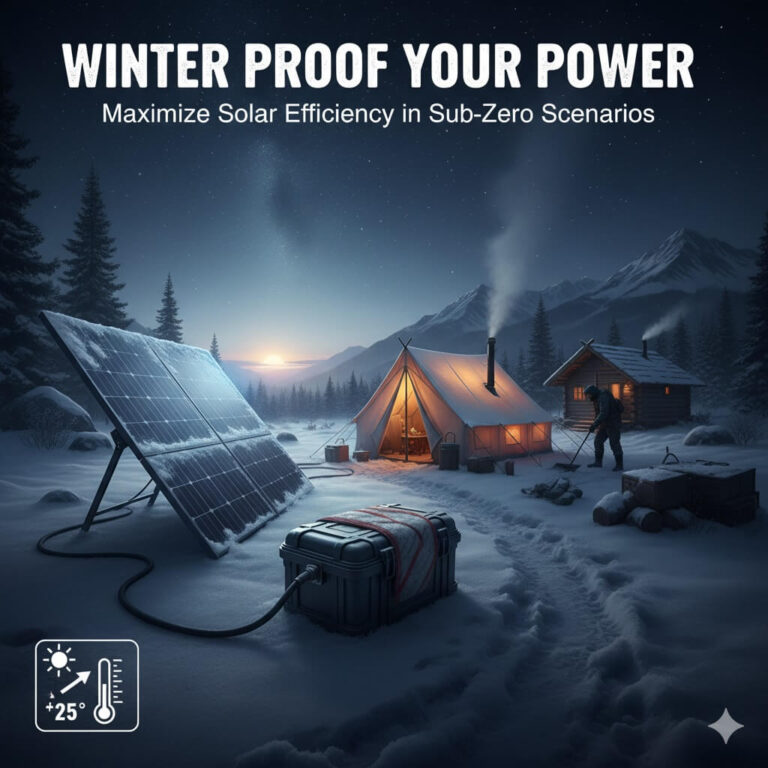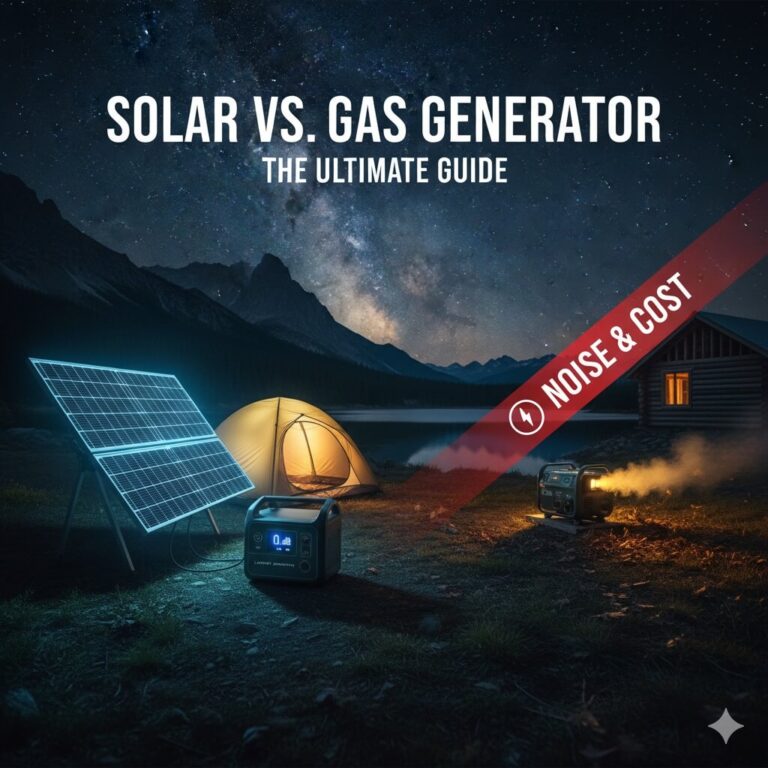No Engineering Degree? Your Guide to High-Growth Green Energy Jobs in 2025

No Engineering Degree? Your Guide to High-Growth Green Energy Jobs in 2025
Are you passionate about a sustainable future but worried your non-engineering background might hold you back from the booming green energy sector? Think again! The clean energy revolution is creating a diverse array of high-growth green energy jobs in 2025 that don’t require an engineering degree. This dynamic industry offers not just competitive salaries and job security but also the profound satisfaction of contributing directly to a healthier planet.
The green energy sector is experiencing explosive growth, driven by global climate goals, rapid technological advancements, and significant investments like the U.S. Inflation Reduction Act (IRA). This expansion fuels a continuous demand for a broad workforce, far beyond just highly specialized engineers. Many individuals, however, are missing out on lucrative and purpose-driven careers because they believe they lack the “right” degree.
This guide shatters that myth, opening doors to accessible, high-growth opportunities. We’ll unveil the top high-growth green energy jobs in 2025 that require no engineering degree, outlining their responsibilities, projected growth, salary potential, and the practical pathways—including certifications, vocational training, and apprenticeships—to get hired and thrive. Get ready to explore your future in the green economy!
- No Engineering Degree? Your Guide to High-Growth Green Energy Jobs in 2025
- 1. Debunking the Myth: Why Green Energy Isn’t Just for Engineers
- 2. High-Growth Green Energy Jobs for Non-Engineers in 2025: Your Top Opportunities
- 3. Your Roadmap to a Green Energy Career: Skills & Training Pathways
- 4. Beyond the Core: Related Roles and Future Opportunities
- 5. Getting Hired in 2025: Tips for Job Seekers Without an Engineering Degree
- Conclusion: Your Green Future Starts Now!
- Frequently Asked Questions (FAQs) About Green Energy Jobs Without Engineering Degrees
1. Debunking the Myth: Why Green Energy Isn’t Just for Engineers
The perception that green energy jobs are exclusively for those with advanced engineering degrees is a common misconception. While engineers are crucial for designing and researching cutting-edge technologies, the vast majority of roles in renewable energy focus on the hands-on implementation, maintenance, operation, and support of these systems.
The sheer scale of renewable energy deployment, energy efficiency upgrades, and the burgeoning electric vehicle infrastructure demands a broad and diverse workforce. Think of it this way: for every engineer designing a solar panel, dozens of skilled professionals are needed to install, connect, and maintain it. This has given rise to the “green collar” revolution—a surge in demand for skilled trades and technical professionals who are at the forefront of building our sustainable future. These roles offer robust job security and excellent earning potential without the traditional four-year engineering degree.

2. High-Growth Green Energy Jobs for Non-Engineers in 2025: Your Top Opportunities
The green energy sector is projected to grow significantly, creating numerous high-growth green energy jobs in 2025 for individuals seeking purpose-driven careers without an engineering background. Here are some of the top opportunities:
- Solar Photovoltaic (PV) Installer
- Role: Install, maintain, and repair solar panels on rooftops, ground mounts, and other structures. This involves electrical wiring, structural mounting, and system troubleshooting.
- 2025 Outlook: Continues to be one of the fastest-growing occupations. The U.S. Bureau of Labor Statistics (BLS) projects growth around 48% between 2023 and 2033, much faster than average.
- Median Salary (as of May 2025): Approximately $70,140/year (Salary.com). Entry-level wages are competitive, with experienced installers earning well over $80,000.
- Entry Pathway: Typically requires a high school diploma, significant on-the-job training, vocational programs, or certifications like the NABCEP PV Associate.
- Wind Turbine Technician
- Role: Install, inspect, maintain, and repair wind turbines. This physically demanding job often involves working at significant heights and troubleshooting electrical and mechanical issues.
- 2025 Outlook: Exceptionally high growth, projected around 60% by the BLS (2023-2033), making it one of the fastest-growing jobs across all industries. A worker shortage is anticipated by 2030 (NREL).
- Median Salary (as of May 2025): Approximately $62,580/year (Research.com). Entry-level roles start around $49,000, while experienced technicians, especially in offshore wind, can earn over $90,000, with overtime and per diem adding significantly.
- Entry Pathway: Often requires an associate’s degree in wind energy technology or industrial maintenance from a technical school. Global Wind Organization (GWO) Basic Safety Training is essential.
- Energy Efficiency Auditor/Technician
- Role: Evaluate residential and commercial buildings’ energy use, identify areas of waste, recommend improvements (like better insulation or HVAC systems), and often assist with accessing energy incentives.
- 2025 Outlook: Projected for strong growth, with related roles like Environmental Science & Protection Technicians growing 7% (BLS). Energy efficiency consultants see high demand (MyCVCreator).
- Median Salary (as of May 2024 for Env. Techs): Approximately $49,490/year (BLS). More specialized energy efficiency consultants can earn between $65,000 and $95,000.
- Entry Pathway: High school diploma, some college coursework, vocational training, and certifications like BPI Building Analyst or AEE Certified Energy Auditor (CEA).
- Electric Vehicle (EV) Charging Infrastructure Technician/Installer
- Role: Install, maintain, and troubleshoot EV charging stations for homes, businesses, and public spaces. This involves working with electrical systems and network connectivity.
- 2025 Outlook: Very high growth, directly driven by the rapid adoption of EVs. MyCVCreator estimates a 30% growth for EV Specialists.
- Median Salary: EV Specialists can earn between $70,000 and $110,000 (MyCVCreator). Installation and maintenance roles are competitive within this range.
- Entry Pathway: An electrical apprenticeship, vocational training in electrical systems, and specific EV charging certifications are highly beneficial.
- Green Construction/Building Trades (e.g., Weatherization Installer, Green Building Professional)
- Role: Work on construction projects that incorporate sustainable materials, energy-efficient designs, and environmentally friendly practices. This includes roles in insulation, air sealing, sustainable plumbing, and general green building.
- 2025 Outlook: Strong growth tied to increasing demand for green buildings and energy-efficient retrofits. MyCVCreator estimates 18% growth for Green Building Professionals.
- Median Salary: Varies widely by specific trade and experience. A green construction manager can earn around $80,956 (Zety).
- Entry Pathway: Apprenticeships, vocational schools, and on-the-job training are common. Certifications like LEED Green Associate or specific green building certifications are valuable.
- Sustainability Coordinator/Specialist (Entry-Level)
- Role: Support sustainability initiatives within companies or organizations. This often involves data collection, reporting on environmental performance, employee engagement programs, and project coordination.
- 2025 Outlook: Strong and growing across many industries as companies prioritize ESG (Environmental, Social, and Governance) goals.
- Median Salary: Coordinator roles may start around $50,000-$70,000, with higher potential for more experienced specialists or consultants.
- Entry Pathway: Often requires a Bachelor’s degree in environmental science, business, or a related non-engineering field. Relevant internships and sustainability certifications (e.g., ISSP, LEED Green Associate) are highly beneficial.
Key Takeaway: These roles offer competitive salaries and strong job security, proving that a rewarding career in green energy is well within reach for individuals without an engineering degree.
3. Your Roadmap to a Green Energy Career: Skills & Training Pathways
Even without an engineering degree, you can build a successful career in green energy by cultivating the right skills and pursuing targeted training.
Essential Soft Skills:
- Problem-solving & Critical Thinking: Essential for diagnosing issues and finding efficient solutions.
- Strong Communication: Crucial for working in teams, explaining technical concepts to clients, and reporting.
- Adaptability & Continuous Learning: The green energy sector evolves rapidly, requiring a willingness to learn new technologies and methods.
- Attention to Detail & Safety Conscientiousness: Especially vital in installation and maintenance roles.
- Teamwork: Most projects involve collaboration with diverse teams.
- Customer Service: Important for roles interacting with clients or the public.
- Passion for Sustainability: While not a “skill,” genuine commitment is highly valued by employers.
Key Technical Skills (Vary by Role):
- Electrical and Mechanical Aptitude
- Troubleshooting and Diagnostics
- Basic Data Collection and Analysis
- Construction and Safety Protocols (e.g., OSHA 10/30 certification)
- Specific System Knowledge (e.g., solar PV components, wind turbine hydraulics, HVAC systems, EV charging protocols)
Practical Training & Education Pathways:
- Vocational Schools & Community Colleges: These institutions are hubs for hands-on learning. They offer specialized associate’s degrees and certificate programs (e.g., solar energy technology, wind energy technology, HVAC, and electrical). Many programs include direct practical experience.
- Apprenticeships: Combining paid on-the-job training with classroom instruction, apprenticeships are an excellent way to gain skills and earn money simultaneously. They are common in electrical, plumbing, and specific renewable energy trades, often leading to full certification. The International Brotherhood of Electrical Workers (IBEW) offers robust apprenticeship programs relevant to solar and EV charging.
- Industry Certifications: These credentials validate your expertise and are highly sought after by employers:
- NABCEP (North American Board of Certified Energy Practitioners): Gold standard for solar PV and solar heating professionals.
- GWO (Global Wind Organisation): Essential safety training for wind technicians, including Working at Heights, First Aid, and Fire Awareness.
- BPI (Building Performance Institute): For energy auditors and weatherization professionals.
- AEE (Association of Energy Engineers): Offers Certified Energy Auditor (CEA) and other specialized energy management certifications.
- OSHA 10/30: Basic and advanced safety certifications are often required for fieldwork.
- Online Courses & Bootcamps: These can provide focused training in specific skills like data analysis for sustainability reporting, project coordination, or software relevant to the green sector.
- On-the-Job Training: Many entry-level positions, especially with rapidly expanding companies, offer on-the-job training programs, providing a direct pathway into the field.

4. Beyond the Core: Related Roles and Future Opportunities
The green energy sector’s reach extends far beyond direct installation and maintenance, opening doors to many related roles that do not require an engineering background. As the industry matures, new specializations continue to emerge:
- Sales & Marketing: Companies selling solar systems, energy efficiency upgrades, and EV charging solutions need skilled sales representatives and marketing specialists to reach customers.
- Project Coordination & Administration: Large-scale renewable energy projects require meticulous planning and oversight. Project coordinators, administrative assistants, and logistics specialists play vital roles in keeping operations running smoothly.
- Environmental Compliance Technician: These professionals help organizations meet environmental regulations, monitor emissions, and ensure project adherence to local and federal standards.
- Waste Management & Recycling Specialists: With a growing focus on the circular economy, experts in managing and recycling green tech components (like solar panels and EV batteries) will be in high demand.
- Sustainable Agriculture & Land Management: Beyond energy, the green economy includes roles for farm managers adopting regenerative practices, soil technicians, and agro-ecology specialists.
- Smart Grid & Energy Storage Support: As grids become more decentralized and incorporate more battery storage, technicians and operators will be needed to manage these complex systems.
Working in these roles often provides not just financial stability but also a profound sense of purpose. You directly contribute to mitigating climate change, reducing pollution, and building a more resilient future.
5. Getting Hired in 2025: Tips for Job Seekers Without an Engineering Degree
Launching your green energy career without an engineering degree is achievable with a strategic approach:
- Tailor Your Resume & Cover Letter: Don’t use a generic resume. Research each job description thoroughly and highlight your transferable skills, relevant certifications, training, and any hands-on experience. Use keywords from the job posting naturally.
- Network Relentlessly: The green energy community is often very collaborative. Attend industry events, join online professional groups (e.g., on LinkedIn), and connect with people working in roles that interest you. Many opportunities come from referrals.
- Gain Hands-On Experience: Look for internships, volunteer opportunities with local environmental organizations, or even personal projects related to energy efficiency or renewables. Practical experience often trumps formal degrees in trades.
- Highlight Certifications & Training: In the absence of a traditional degree, industry-recognized certifications and vocational training validate your expertise and commitment to the field. Make these prominent on your resume and during interviews.
- Showcase Your Passion: Employers in the green sector value individuals who are genuinely committed to sustainability. Be ready to articulate why you want to work in green energy and what drives your interest.
- Prepare for Interviews: Research the company’s projects and values. Be ready to discuss specific skills, troubleshooting scenarios relevant to the role, and how you handle challenges. Emphasize your problem-solving abilities and eagerness to learn.
- Case Study: Take Maria, for example. A former construction worker, she completed an intensive 6-month solar installation vocational program and obtained her NABCEP PV Associate certification. Leveraging her existing construction skills and new solar knowledge, she secured an entry-level solar installer position, quickly advancing due to her dedication and hands-on expertise. Her story demonstrates how practical skills and targeted training can unlock a high-growth green energy career.
Conclusion: Your Green Future Starts Now!
The green energy sector is booming, offering a wealth of high-growth, well-paying opportunities for individuals from all educational backgrounds—you absolutely do not need an engineering degree to thrive here. From vital hands-on roles like solar installers and wind turbine technicians to essential support positions in energy efficiency and EV charging, your impactful career in green energy is within reach.
The accelerated growth in 2025, driven by ongoing investment and policy support, makes this a prime time to enter the field. Don’t let misconceptions limit your potential. Embrace the dual benefits of these careers: financial stability and the immense satisfaction of contributing directly to a sustainable planet.
The path to a greener, more resilient future starts with your decision. Explore the listed roles, research relevant vocational training or industry certifications, and start networking today. Your impactful career in green energy is waiting—take the first step and apply your passion to build a better world!
Frequently Asked Questions (FAQs) About Green Energy Jobs Without Engineering Degrees
- Q: What are the fastest-growing green energy jobs that don’t require an engineering degree?
- A: Solar PV Installers, Wind Turbine Technicians, and EV Charging Infrastructure Technicians are among the fastest-growing roles. Energy efficiency auditors and green construction professionals also show strong demand.
- Q: What kind of training do I need for these jobs if I don’t have a degree?
- A: Many roles can be entered through vocational schools, community college programs, apprenticeships, or specific industry certifications (like NABCEP for solar or GWO for wind). On-the-job training is also common.
- Q: Are green energy jobs without an engineering degree well-paying?
- A: Yes, many roles offer competitive salaries. For example, solar PV installers can earn around $70,000/year, and wind turbine technicians around $62,000/year, with potential for higher earnings based on experience and specialization.
- Q: Can I transition into a green energy job from an unrelated field?
- A: Absolutely. Many green energy roles value transferable skills like problem-solving, mechanical aptitude, and safety consciousness. Targeted vocational training and industry certifications can help bridge any knowledge gaps.
- Q: What is the demand for these types of green jobs in 2025?
- A: The demand is very high and rapidly growing, fueled by significant investments in renewable energy and decarbonization efforts. This growth is projected to continue well beyond 2025.



